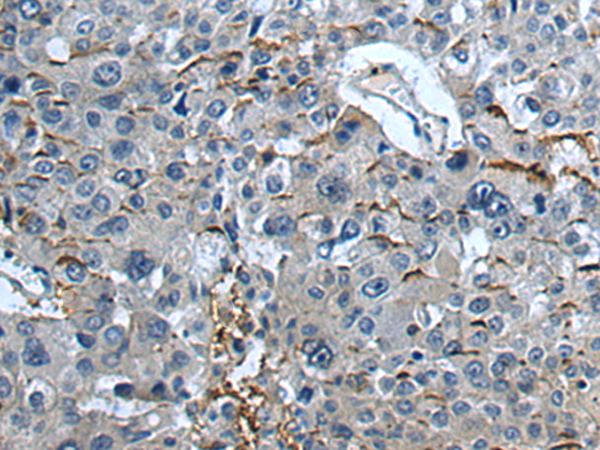

| WB | 咨询技术 | Human,Mouse,Rat |
| IF | 咨询技术 | Human,Mouse,Rat |
| IHC | 1/25-1/50 | Human,Mouse,Rat |
| ICC | 技术咨询 | Human,Mouse,Rat |
| FCM | 咨询技术 | Human,Mouse,Rat |
| Elisa | 1/5000-1/10000 | Human,Mouse,Rat |
| Aliases | DRP3; ULIP; CRMP4; DRP-3; LCRMP; CRMP-4; ULIP-1 |
| WB Predicted band size | 62 kDa |
| Host/Isotype | Rabbit IgG |
| Antibody Type | Primary antibody |
| Storage | Store at 4°C short term. Aliquot and store at -20°C long term. Avoid freeze/thaw cycles. |
| Species Reactivity | Human, Mouse, Rat |
| Immunogen | Synthetic peptide of human DPYSL3 |
| Formulation | Purified antibody in PBS with 0.05% sodium azide and 50% glycerol. |
+ +
以下是关于DPYSL3抗体的3篇参考文献的简要总结:
1. **"Collapsin response mediator protein 3 (CRMP3) promotes axonal regeneration after traumatic brain injury"**
*作者:Quinn CC 等*
摘要:该研究利用DPYSL3(CRMP3)抗体分析其在神经元损伤后的表达变化,发现CRMP3通过调控微管动力学促进轴突再生,抗体用于Western blot和免疫荧光验证蛋白定位。
2. **"DPYSL3 modulates cell proliferation and motility in lung cancer via EMT signaling"**
*作者:Zhang Y 等*
摘要:研究通过DPYSL3抗体检测其在肺癌组织中的高表达,发现其通过激活上皮-间质转化(EMT)促进癌细胞迁移和转移,抗体用于免疫组化及体外功能实验。
3. **"CRMP family protein DPYSL3 regulates neurodevelopmental processes and glioblastoma invasion"**
*作者:Horiuchi A 等*
摘要:该文献利用DPYSL3抗体研究其在神经发育和胶质母细胞瘤中的作用,发现其通过RhoA/ROCK通路调控细胞迁移,抗体应用于流式细胞术及组织切片分析。
The DPYSL3 (Dihydropyrimidinase-like 3) gene, also known as CRMP3 (Collapsin Response Mediator Protein 3), encodes a cytosolic phosphoprotein belonging to the DPYSL/CRMP family. These proteins are critically involved in neuronal development, including axon guidance, dendritic patterning, and synaptic plasticity, primarily through interactions with tubulin heterodimers and microtubule dynamics. DPYSL3 is expressed in the nervous system and other tissues, playing roles in signal transduction and cytoskeletal reorganization.
Antibodies targeting DPYSL3 are widely used in research to investigate its expression, localization, and function in physiological and pathological contexts. For example, studies employ DPYSL3 antibodies in techniques like Western blotting, immunohistochemistry, and immunofluorescence to explore its role in neurodegenerative diseases (e.g., Alzheimer’s), neurodevelopmental disorders, and cancer. In oncology, DPYSL3 has been implicated in tumor progression and metastasis, with altered expression observed in malignancies such as breast cancer and glioblastoma.
Commercially available DPYSL3 antibodies are typically validated for specificity and application compatibility. However, researchers must verify cross-reactivity due to homology among DPYSL family members. Understanding DPYSL3's molecular interactions and pathways through antibody-based assays contributes to elucidating its therapeutic potential, particularly in modulating cytoskeletal dynamics or signaling cascades in disease models.
×